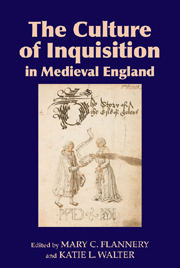Book contents
- Frontmatter
- Contents
- Illustrations
- List of Contributors
- Acknowledgements
- Abbreviations
- Introduction: Imagining Inquisition
- 1 Inquisition, Public Fame and Confession: General Rules and English Practice
- 2 The Imperatives of Denunciatio: Disclosing Others' Sins to Disciplinary Authorities
- 3 English Provincial Constitutions and Inquisition into Lollardy
- 4 The Contest over the Public Imagination of Inquisition, 1380–1430
- 5 ‘Vttirli Onknowe’? Modes of Inquiry and the Dynamics of Interiority in Vernacular Literature
- 6 From Defacement to Restoration: Inquisition, Confession and Thomas Usk's Appeal and Testament of Love
- 7 Confession, Inquisition and Exemplarity in The Erle of Tolous and Other Middle English Romances
- 8 Heresy Inquisition and Authorship, 1400–1560
- 9 Imitating Inquisition: Dialectical Bias in Protestant Prison Writings
- 10 Response Essay: Chaucer's Inquisition
- Bibliography
- Index
1 - Inquisition, Public Fame and Confession: General Rules and English Practice
Published online by Cambridge University Press: 05 April 2013
- Frontmatter
- Contents
- Illustrations
- List of Contributors
- Acknowledgements
- Abbreviations
- Introduction: Imagining Inquisition
- 1 Inquisition, Public Fame and Confession: General Rules and English Practice
- 2 The Imperatives of Denunciatio: Disclosing Others' Sins to Disciplinary Authorities
- 3 English Provincial Constitutions and Inquisition into Lollardy
- 4 The Contest over the Public Imagination of Inquisition, 1380–1430
- 5 ‘Vttirli Onknowe’? Modes of Inquiry and the Dynamics of Interiority in Vernacular Literature
- 6 From Defacement to Restoration: Inquisition, Confession and Thomas Usk's Appeal and Testament of Love
- 7 Confession, Inquisition and Exemplarity in The Erle of Tolous and Other Middle English Romances
- 8 Heresy Inquisition and Authorship, 1400–1560
- 9 Imitating Inquisition: Dialectical Bias in Protestant Prison Writings
- 10 Response Essay: Chaucer's Inquisition
- Bibliography
- Index
Summary
My mode of procedure in this essay will be to discuss the institution and development of inquisitorial procedure in general canon law, first with regard to all criminal cases, and then specifically applied to cases of heresy, and, finally, to examine some of the ways in which the rules were applied or modified in England. On the continent, inquisitorial procedure became the standard practice in secular as well as ecclesiastical courts, and many areas of the continent were dominated by papally appointed heresy inquisitors, whereas in England there was no papal heresy inquisition and the secular courts used a different system of criminal prosecution, based on the tradition of common law. The chief impact of English inquisitorial procedure, therefore, was not in the realm of heresy prosecution, which was relatively infrequent, but rather in the area of sexual relations: a large percentage of the business of church courts dealt with clandestine marriages and the high frequency of bigamy that the practice gave rise to, and also the uncovering and punishment of fornication and adultery. Church courts in England were far more involved in policing the morals of parishioners than in any other region of medieval and Renaissance Europe.
- Type
- Chapter
- Information
- The Culture of Inquisition in Medieval England , pp. 8 - 29Publisher: Boydell & BrewerPrint publication year: 2013



